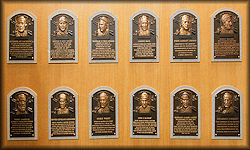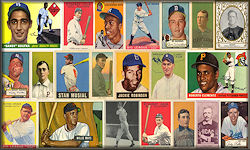In a career that spanned multiple generations and multiple revolutionary changes in baseball, Branch Rickey was always looking to innovate.
A conservative and religious man who notably refused to participate in Sunday ball games as a player and a manager, Rickey was anything but traditional in the way he approached baseball as an executive. He invented the modern farm system and the batting helmet, was an advocate for expansion into new markets and most notably broke the color barrier when he brought Jackie Robinson to the Brooklyn Dodgers in 1947.
“The scope of his thinking constantly surprised even those who knew him well,” his grandson, Branch B. Rickey, recalled. “He was always lecturing, tutoring, motivating, cautioning and inspiring.”
Rickey’s life in baseball began as a player for the St. Louis Browns and New York Highlanders from 1905-07. After struggling on the diamond, Rickey left the game and enrolled in law school at the University of Michigan.
Rickey returned to baseball in 1914, this time as an executive and manager for the St. Louis Browns, before moving across town to manage the Cardinals in 1919. Team president Sam Breadon fired Rickey the manager in 1925 after seven middling seasons, but chose to retain Rickey as general manager because of his acumen for developing players.
It was in the front office where Rickey found his calling. He invested in the purchases of several minor league teams and created a feeder system – later termed the “farm system” – that developed young players and seasoned them for the major leagues. By the early 1930s, Rickey’s investments paid off as the Cardinals, led by homegrown talent including Pepper Martin, Joe Medwick and brothers Dizzy and Daffy Dean, won three pennants and two World Series from 1930 to 1934. Soon, other major league teams copied Rickey’s idea and created their own farm systems.
In his 17 years with the Cardinals, Rickey made his club nearly perennial contenders in the National League with his shrewd negotiating tactics.
“It occurred to me that if I let myself get trapped in a room with Rickey, there was a strong possibility that he would still have the players I wanted, as well as my promissory note, and I would end up with two guys I had never heard of,” said Browns owner Bill Veeck.
Rickey’s Cardinals won another World Series – with another crop of homegrown players including Hall of Famers Enos Slaughter and Stan Musial – in 1942, his final year with the team. That winter, the Brooklyn Dodgers hired Rickey as team president and general manager.
Rickey brought his innovative spirit with him to Brooklyn. He encouraged the team to use batting cages, pitching machines and batting helmets and foreshadowed the modern-day sabermetric movement by hiring a full-time statistical analyst.
But it was Rickey’s steadfast opposition to baseball’s color barrier that would forever identify him as one of the game’s great pioneers. He signed Negro league star Jackie Robinson to a minor league contract in 1945, and paved the way for Robinson’s major league debut on April 15, 1947. Anticipating the harsh treatment that Robinson would receive from fans and opposing players, Rickey told Robinson he was looking for a man who “had guts enough not to fight back.”
Robinson followed Rickey’s advice with remarkable restraint. Amidst racial slurs, objects thrown at him from the crowd and even death threats, Robinson quietly exceled on the diamond and went on to win National League Rookie of the Year and Most Valuable Player Awards during his career.
"I realized how much our relationship had deepened after I left baseball,” Robinson later said of Rickey. “Branch, especially after I was no longer in the sports spotlight, treated me like a son."
Rickey served three more years in the Dodgers’ front office before ending his career with the Pittsburgh Pirates and a brief return stint with the Cardinals. In 1967, two years after his death from a heart attack, Rickey was elected to the Hall of Fame. (Ref: National Baseball Hall of Fame) |





